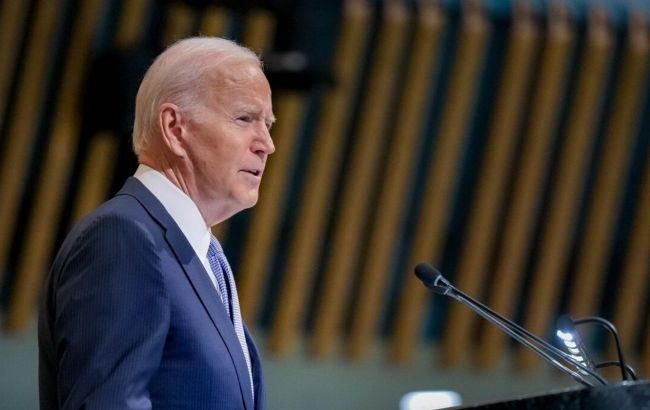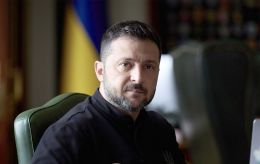Last time as president. Key points from Biden's farewell speech at UN
 Photo: US President Joe Biden delivers a farewell speech at the UN General Assembly (ua.usembassy.gov)
Photo: US President Joe Biden delivers a farewell speech at the UN General Assembly (ua.usembassy.gov)
US President Joe Biden delivered a speech at the UN General Assembly, which will be his last as American leader. He spoke extensively about the wars in Ukraine, the Middle East, and Africa, and also identified the main challenges facing the world.
RBK-Ukraine has compiled the key statements from Biden.
At the beginning, Biden noted that this was his last speech at the UN General Assembly. He then spoke about his extensive political experience, particularly how he witnessed the Cold War and the Vietnam War, which at that time was the longest conflict in US history.
"The United States and the world got through that moment. It wasn't easy or simple. But we go on to reduce the threat of nuclear weapons through arms control. And then bring the Cold War itself to an end," he said.
According to him, today America, together with its partners, demonstrates that we can reconcile and move forward. He also mentioned how he fought against apartheid in South Africa, war crimes, and against al-Qaeda. When he became president, he decided to withdraw troops from Afghanistan and restored US leadership in international politics.
On a turning point in history
Biden continued his speech with words about the belief in the possibility of restoring peace in Gaza, Sudan, and beyond, as well as addressing the climate crisis. "War, hunger, terrorism, brutality, record, displacement of people, a climate crisis, democracy at risk, strain in our societies, the promise of artificial intelligence - and a significant risk. The list goes on. But maybe because all I've seen and all we have done together over the decades, I have hope. I know there is a way forward," he noted.
During his presidency, he managed to overcome the COVID pandemic, protect the UN Charter, and ensure that Ukraine survives as a free state.
"There will always be forces that pull our countries apart and the world apart – aggression, extremism, chaos and cynicism, a desire to retreat from the world and go it alone. Our task, our test, is to make sure that the forces holding us together are stronger... I truly believe we’re at another inflection point in world history. The choices we make today will determine our future for decades to come," the president emphasized.
He also identified the main challenges facing the world: aggression, hunger, climate change, diseases, and new technologies.
On Russia's war against Ukraine
Biden emphasized that the UN General Assembly is making decisions on actions that must be implemented to deal with aggression.
"When Russia invaded Ukraine, we could have stood by and merrily protested. Vice President Harris and I understood that was an assault and everything that this institution is supposed to stand for. And so, America stepped in the breach, providing massive humanitarian assistance Our allies in 50+ nations stood up as well. Most importantly, the Ukrainian people stood up. The good news is Putin‘s war has failed at its core aim. He said out to destroy Ukraine, but Ukraine is still free," he said.
Putin also tried to weaken NATO, but NATO is stronger than ever, with two new members, Finland and Sweden. Now the world faces a choice: to support Ukraine or allow Russia to destroy it.
"I know my answer. We cannot grow weary. We cannot look away. And we will not let up on our support for Ukraine," Biden added.
On relations with China
"We seek to responsibly manage the competition with China so it does not veer into conflict. We stand ready to cooperate on urgent challenges for the good of our people and the people everywhere," the American leader stated.
In his view, both sides must refrain from military competition and protect the most advanced technologies. Additionally, Beijing and Washington should work together to promote peace in the Indo-Pacific region and the Middle East.
On Israel's war against Hamas and Hezbollah
Biden described the situation in Gaza as catastrophic and stated that the UN Security Council is calling for a ceasefire to end Gaza's suffering and to free the region from Hamas.
Nearly a year after the war against Hamas began, escalation has also erupted on Israel's northern border with Hezbollah militants. However, a diplomatic solution is still possible, he emphasized.
He called on Israel and Hamas to finalize the terms of a peace deal and to address the condition of innocent Palestinians in the West Bank facing violence.
“Now is the time for the parties to finalize its terms, bring the hostages home and secure security for Israel, a Gaza free of Hamas’s grip, ease the suffering in Gaza, end this war, “ he said.
On hunger and global warming
Biden highlighted the severe humanitarian crisis in Sudan, where 8 million people are on the brink of famine, with hundreds of thousands already starving.
"The United States has led the world in providing humanitarian aid to Sudan. With our partners, we’ve led diplomatic talks to try to silence the guns and avert a wider famine. The world needs to stop arming the general and tell them to stop tearing the country apart… and end this war now"
He emphasized that the absence of war offers a chance to live with dignity and be protected from climate change. His administration has invested over $150 billion to support sustainable environmental development, and under the Paris Climate Agreement, the US will reduce emissions by 2030.
Additionally, it is crucial to deliver millions of vaccine doses to developing countries.
"We call on our partners to match our pledge and make this a billion-dollar commitment to the people of Africa. We want to get things done together. We must pull a stronger more effective and inclusive united nations. The UN ambassador laid out a detailed vision of today's world. Not yesterday’s. It's time to move forward," Biden stressed.
On the threats of Artificial Intelligence
Biden pointed out that the world is currently facing the greatest technological changes in the last 50 years. "Artificial intelligence is going to change our ways of life, our ways of work, our ways of war. But AI also brings profound risks, from deep fakes to disinformation to novel pathogens to bioweapons," he said.
He added that no one knows how AI will develop and be used, but it must be ensured that its application is safe.
"But let's be honest, this is just the tip of the iceberg. What we need to do to manage this new technology...We must make certain that the awesome capabilities of AI will be used to uplift and empower everyday people, not to give dictators more powerful shackles on the human spirit in the years ahead," Biden suggested.
On political responsibility
Biden mentioned that over the summer, he decided not to run for a second term. "It was a difficult decision—being president has been the honor of my life. As much as I love the job, I love my country more. It’s time for a new generation of leadership to take my nation forward," he said.
He also urged world leaders not to forget that there are things more important than power.
"It's your people that matter the most. Never forget we are here to serve the people, not the other way around. Because the future will be wonby those that unleash the full potential of the people who think freely and innovate, educate, live and love openly... that’s the soul of democracy," Biden concluded.

